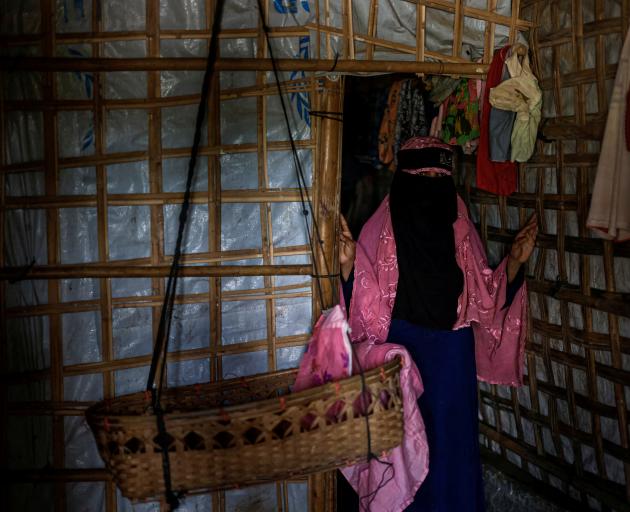Politics
Refugee Children in Bangladesh Lose Educational Opportunities

Schools for Rohingya refugee children in Bangladesh have closed, leaving over 227,500 children without education. This alarming situation arises as funding cuts impact essential services in the world’s largest refugee settlement located in Cox’s Bazar. The United Nations refugee agency, UNHCR, has highlighted that without urgent additional support, critical assistance, including education, may collapse.
The plight of families affected by this crisis is dire. Begum, a 35-year-old mother with five daughters, expressed concern about her children’s future. “Without school, girls sit idle. People start talking,” she said, fearing that her 16-year-old daughter might be forced into early marriage if educational opportunities remain unavailable. The Rohingya community in Bangladesh, which numbers around 1.2 million, consists mainly of individuals who fled violence and persecution in Myanmar.
As the eighth anniversary of the mass displacement approaches, the situation has grown increasingly precarious. More than 700,000 Rohingya crossed into Bangladesh from Myanmar in August 2017, fleeing what UN investigators have termed a “textbook example of ethnic cleansing.” Despite ongoing humanitarian needs, funding has dwindled. The UNHCR requires approximately $256 million for 2023 but has received commitments covering only about 38% of this amount.
Funding Shortfalls Threaten Essential Services
The UNHCR’s interim representative in Bangladesh, Juliette Murekeyisoni, stated, “This community has already lost everything and are now facing a severe funding shortfall that threatens their survival.” This funding gap jeopardizes vital services, including food aid, health care, and education.
UNICEF has also felt the impact of financial constraints. In June, the organization suspended operations at over 4,500 schools, resulting in a loss of education for Rohingya children. Although classes resumed in July for older students, many learning spaces remain abandoned, and teachers, both Rohingya and Bangladeshi, are left without work. “Without education, they become blind. A lost generation,” said Naser Khan, a Rohingya teacher concerned about his students’ future.
Reports from the International Rescue Committee (IRC) reveal that no Rohingya child under 12 in Cox’s Bazar currently has access to education. This lack of educational opportunities has led to alarming increases in child marriage and child labor. The IRC reports a 3% rise in child marriage and a 7% increase in child labor this year.
Long-term Consequences for Rohingya Children
As families face escalating hardships, the consequences of this educational crisis grow more severe. Mohammed Faruq, a father of six who fled Myanmar in 2017, lamented, “Only a little bit of education our children could learn was snatched away.” He fears that without education, his children’s prospects for a better future will be severely diminished.
UNICEF’s representative to Bangladesh, Rana Flowers, emphasized that shifting global priorities have affected contributions to support the refugee population. Despite efforts to reduce costs and streamline operations, the needs continue to outstrip available resources.
The UNHCR has warned that the funding crisis could reverse years of progress for the Rohingya community. With violence persisting in Myanmar, the influx of Rohingya refugees continues, putting additional strain on already limited resources.
As the crisis unfolds, the dreams of young Rohingya children are at stake. Nine-year-old Nahima Bibi, who once aspired to become a doctor, now finds herself playing in muddy lanes instead of attending school. “If I don’t go to school, how will I ever become a doctor?” she quietly asked, reflecting the despair that many children in these camps are feeling.
The future for Rohingya children hangs in the balance, with urgent action required to restore educational opportunities and ensure their dreams do not remain unfulfilled.
-

 Sports1 month ago
Sports1 month agoNetball New Zealand Stands Down Dame Noeline Taurua for Series
-

 Entertainment1 month ago
Entertainment1 month agoTributes Pour In for Lachlan Rofe, Reality Star, Dead at 47
-

 Sports1 month ago
Sports1 month agoSilver Ferns Legend Laura Langman Criticizes Team’s Attitude
-

 Entertainment1 week ago
Entertainment1 week agoNew ‘Maverick’ Chaser Joins Beat the Chasers Season Finale
-

 Entertainment2 months ago
Entertainment2 months agoKhloe Kardashian Embraces Innovative Stem Cell Therapy in Mexico
-

 Sports2 months ago
Sports2 months agoGaël Monfils Set to Defend ASB Classic Title in January 2026
-

 World3 months ago
World3 months agoPolice Arrest Multiple Individuals During Funeral for Zain Taikato-Fox
-

 Politics2 weeks ago
Politics2 weeks agoNetball NZ Calls for Respect Amid Dame Taurua’s Standoff
-

 Entertainment3 weeks ago
Entertainment3 weeks agoTyson Fury’s Daughter Venezuela Gets Engaged at Birthday Bash
-

 Sports3 weeks ago
Sports3 weeks agoHeather McMahan Steps Down as Ryder Cup Host After Controversy
-

 Entertainment3 weeks ago
Entertainment3 weeks agoTyson Fury’s Daughter Venezuela Gets Engaged at Birthday Bash
-

 World2 weeks ago
World2 weeks agoNew Zealand Firefighters Plan Strike on October 17 Over Pay Disputes





















